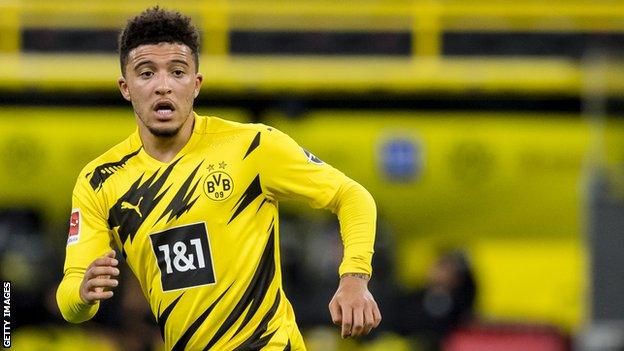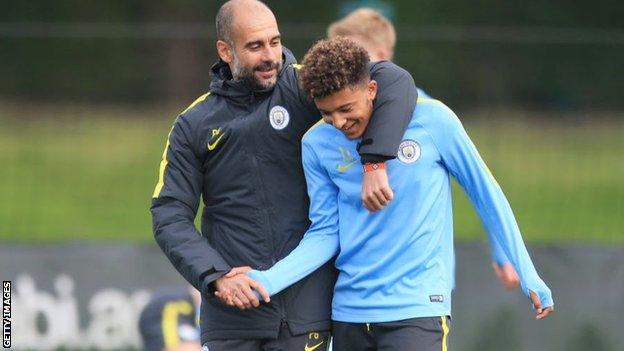Jadon Sancho: 'A talented trailblazer and hybrid of the modern age'
- Published

Jadon Sancho joined Borussia Dortmund from Manchester City aged 17
The 'cultural reboot' Manchester United let it be known they were aiming for after Jose Mourinho's departure and the arrival of Ole Gunnar Solskjaer in 2018 is difficult to define.
United are not the only ones to talk about their "DNA" as though there is a coherent thread running through an organisation more than 100 years old.
In truth, it is merely a nod to the time a club was at its best - reminders which recapture former glories, and generate a feel-good factor with the promise of better times to come.
To that end, the prospect of a young Londoner playing on the right wing at Old Trafford, even if the famous number seven shirt cannot be his just yet as it belongs to Edinson Cavani, brings recollections of David Beckham.
And his style, speed, directness and ability to beat an opponent with a deft piece of skill or movement of the hips, is straight out of the playbook created by, among others, Cristiano Ronaldo, Ryan Giggs and George Best.
The return of Jadon Sancho to Manchester, four years after he left City for Borussia Dortmund, will be one of the biggest deals of the summer, both for the price and the excitement it generates.
That his value has gone from £10m to £73m underlines the progress the 21-year-old has made in Germany.
But what can United supporters expect from a player returning home to a country where he has never even made the bench for a Premier League game?
Coming 'home'
A lot has happened to Sancho since he went to the Bundesliga.
The decision to move there was triggered by a series of performances during the 2017 European Under-17 Championship, where he was player of the tournament as England reached the final.
Sancho's camp felt the teenager was capable of more than was being offered by the new contract presented to him by Manchester City. A £30,000 weekly salary was evidence of City's hopes for Sancho but, as proved to be the case with Phil Foden, manager Pep Guardiola felt gradual exposure to the first team was the best way forward.
Sancho didn't want to wait. And Dortmund offered him an opportunity.
Twelfth in the Forbes list of the world's richest clubs, they are still, financially, a long way behind Bundesliga rivals Bayern Munich.
Attracting youth is a way of bridging the gap. When they pitch to youngsters, they show off their teamsheet. Last season that included Sancho, Erling Braut Haaland, Jude Bellingham and Gio Reyna. Haaland is 21, Bellingham and Reyna just 18.
"It is obvious," said Sancho, when asked in a 2019 interview why he joined Dortmund. "They play a lot of young players. They have faith in young players.
"It is a big club, in a good league, so why not?"
Sancho's reasoning was sound - and the outcome justifies him snubbing City's contract offer, and the brief time he spent refusing to train at City as his path away was plotted.
But there was an unexpected spin-off, which Sancho can no longer be shielded from.
There is no doubting his popularity in the Dortmund squad. Images of him dancing on the table, leading the celebrations after their German Cup final victory - the only significant honour during his time at the club - show a young man happy in his surroundings, and with his team-mates.
Sancho scored twice in the 4-1 hammering of RB Leipzig so he had every reason to be pleased. However, those scenes largely went unnoticed in England. For most, analysis of Sancho's career has been through periodic reminders of goals or assists.
Given he has never been particularly comfortable in the spotlight or doing media, that suited him just fine.
"Dortmund is very quiet," said Sancho. "London is busier. Dortmund is very chilled, but I like this because I can relax."
In returning to England, the option of operating under the radar is no longer there.
Sancho is in a better place to handle the scrutiny than he was at 17. But it exists - and getting used to it may not be easy.

Pep Guardiola worked with Jadon Sancho before he left Manchester City
The street footballer
Sancho is a hybrid of the modern age.
He is an academy product, first at Watford, then at City, but he learned how to play - and how to beat opponents - in street football near his estate in Kennington. He was only seven but would turn up at local tournaments hoping one of the teams was short so he could get a game.
It's that personal history Sancho paid homage to in the design for his own boot collection.
"The street football will never leave me," he said in an interview with Dortmund's YouTube channel. "I grew up with it.
"What I learned from street football is what I have always been doing. It is very different. Football is about having fun."
People around Dortmund wondered prior to Euro 2020 whether England boss Gareth Southgate knew how to integrate that talent into his team. As it turned out, Sancho only started one of England's seven matches in the tournament.
Now the job falls to Solskjaer.
"My strengths? Skills, dribbling, scoring," Sancho said recently.
After missing the Champions League quarter-final defeat by Manchester City with a thigh injury, Sancho returned for all but the first match of the eight-game winning run which earned Dortmund their first silverware in four seasons and swept them back into the Champions League, having been seven points off the pace with seven games remaining.
Sancho scored four goals in that sequence. He also claimed two assists and was man of the match twice.
His overall tally of 16 goals and 20 assists in all competitions, added to 20 and 20 respectively from the previous campaign, underlines his status as one of Europe's most dangerous young players. It is why United have been prepared to make him the fourth most expensive signing in the club's history, after Paul Pogba, Harry Maguire and Romelu Lukaku.
Old head on young shoulders
Sancho was in year eight when he was placed in a boarding school by Watford to reduce his travelling. At 14, he left for Manchester. At 17 he moved to Germany.
That career path confirms both Sancho's mental strength and his desire to succeed.
A couple of years ago, he said his determination was being fuelled by the exploits of Kylian Mbappe and Marcus Rashford, 15 and 29 months older than him respectively. One has won a World Cup. The other is in line to win 50 England caps before he reaches 24. Ambition is evidently not an issue either.
"If you are serious about football, you have to make sacrifices," he said recently.
"You can't be afraid. You can't be the best if you don't take chances."
Sancho, without setting out to be, has become a trailblazer for other promising English hopefuls who fear their talent may be blunted at home through lack of opportunity.
He has never really got to grips with German but has adapted to the country admirably. He no longer has his parents around quite as frequently as he did when he initially moved from City and, despite his tender age, he is one of Dortmund's longest-serving players.
He had control of the music in the dressing room. He helped Bellingham, in particular, settle in.
Sancho has been disciplined at times, but those who have seen him do not believe him to be guilty of anything more than pushing boundaries, which is not exactly unusual in young men of his age. Punishments have been accepted graciously.
Getting to wear the captain's armband for a few minutes against Augsburg in February was an incredibly proud moment.
Without being sure whether they would meet Sancho again, at the end of last season, some Dortmund staff members thanked him for his contribution over the previous four years.
Evidently, a bond exists between player and club that will probably always remain.

Get news and features about your favourite team direct to your phone with the BBC Sport App's Premier League club news notifications, along with line-ups, latest scores and results. Download the App here: Apple, external - Android, external - Amazon., external
Notifications, Live Guide, social media and more with BBC Sport
